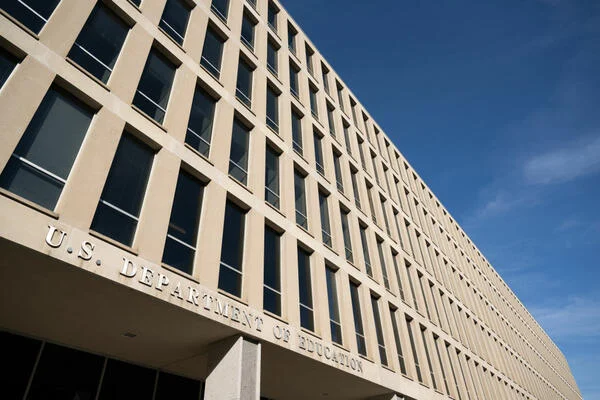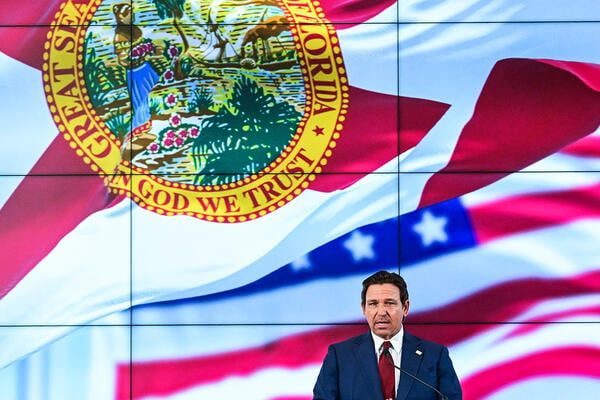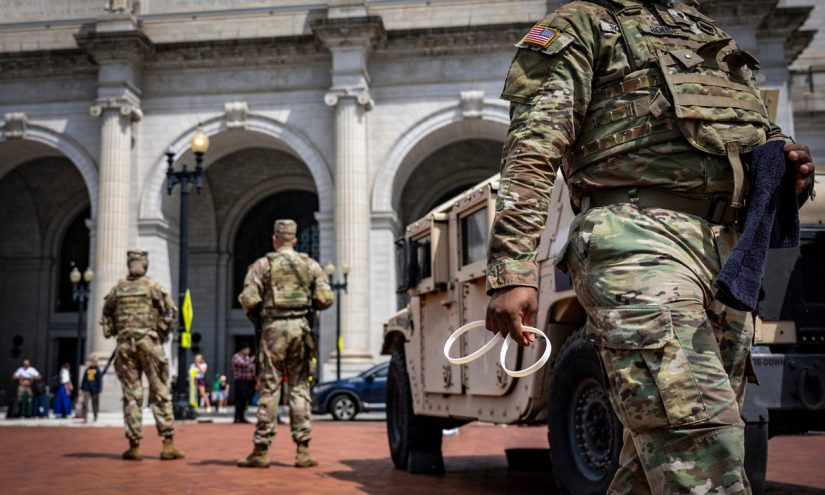by Lawrence Lanahan, The Hechinger Report
December 2, 2025
DENVER — On a bus headed downtown, Cherri McKinney opened a compact mirror and — even as the vehicle rattled and blinding morning sun filled the window — skillfully applied eyeliner.
McKinney is a licensed aesthetician. She went into bookkeeping after graduating from high school in 1992, then ran a waxing salon for years. Later she shifted into human resources at a homeless shelter. But stepping off the bus, she started her work day as a benefits and leave administrator for Colorado’s Department of Labor and Employment.
She wouldn’t have made it past some hiring managers.
“My background is kind of all over the place,” McKinney said. “You might have looked at my résumé and thought, ‘Wow, this girl doesn’t have a college education.’”
In fact, Colorado’s state government was looking for workers just like her. In 2022, Gov. Jared Polis signed an executive order directing state agencies to embrace “skills-based hiring” — evaluating job seekers based on abilities rather than education level — and to open more positions to applicants without college diplomas. When McKinney interviewed with the state in the summer of 2024, she said, she was asked practical questions about topics like the Family Medical Leave Act, not about her academic background.
For a decade, workforce organizations, researchers and public officials have pushed employers to stop requiring bachelor’s degrees for jobs that don’t need them. That’s a response to a hiring trend that began during the Great Recession, when job seekers vastly outnumbered open positions and employers increased their use of bachelor’s degree requirements for many jobs — like administrative assistants, construction supervisors and insurance claims clerks — that people without college diplomas had capably handled. The so-called “paper ceiling,” advocates say, locks skilled workers without degrees out of good-paying jobs. Degree requirements hurt employers, too, advocates argue, by screening out valuable talent.
Related: Interested in more news about colleges and universities? Subscribe to our free biweekly higher education newsletter.
In recent years, at least 26 states, along with private companies like IBM and Accenture, began stripping degree requirements and focusing hiring practices on applicants’ skills. A job seeker’s market after Covid, plus labor shortages in the public sector, boosted momentum. Seven states showed double-digit percentage increases in job listings without a degree requirement between 2019 and 2024, according to the National Governors Association. A 2022 report from labor analytics firm Burning Glass (recently renamed Lightcast) found degree requirements disappearing from private sector listings too.
But less evidence has emerged of employers actually hiring nondegreed job seekers in substantial numbers, and a crumbling economic outlook could stall momentum. Last year, Burning Glass and Harvard Business School found that less than 1 in 700 hires in 2023 benefited from the shift to skills-based hiring. Federal layoffs and other cuts pushing more workers with degrees into the job hunt could tempt employers to return to using the bachelor’s as a filtering mechanism.
“I think it’s a sort of do-or-die moment” for skills-based hiring, said Amanda Winters, who advises state governments on skills-based hiring at the nonprofit National Governors Association.
Winters said the shift to hiring for skills requires time-consuming structural changes. Human resource departments must rewrite job descriptions, and hiring managers must be trained to change their approach to interviewing to assess candidates for skills, among other steps. And even then, said Winters, there’s no reason for managers not to prefer applicants with college degrees if they indeed have the skills.
Related: Students worried about getting jobs are adding extra majors
Colorado is trying to push employers, both public and private, to make this shift. Polis’ 2022 order devoted $700,000 and three staffers to institutionalizing skills-based hiring in state government. According to a case study by the National Governors Association and the nonprofit Opportunity@Work, the state is working with human resources departments at individual agencies, training them to rewrite job descriptions to spell out skills (for example, “active listening and interpersonal skills”). When posting a job, hiring managers are encouraged to click a box that reads: “I have considered removing the degree requirement for this role.”
Polis’ team also built a dashboard to track progress toward “Wildly Important Goals” related to skills-based hiring — like boosting the share of job applicants without a bachelor’s degree by 5 percent by summer 2026. State officials say about 80 percent of job classifications (categories of jobs with specific pay scales and responsibilities — for example, Human Resources Specialist III or Accountant I) now emphasize skills over degrees.
All told, the state says, 25 percent of hires within those job classifications in 2024 — 1,588 in total — were people without degrees, roughly the same share as in 2023, when the state began collecting this information. Similar data from other states on their success in hiring skilled, nondegreed workers is scarce. State officials from Maryland and Pennsylvania, two of the first states with executive orders dropping degree requirements, said they track education levels of applicants but not of new hires.
To spark skills-based hiring in the private sector, the Colorado Workforce Development Council, a quasi-governmental group appointed by the governor, encourages local workforce boards to help assess employers’ needs and job seekers’ skills.
One of those boards — Pikes Peak Workforce Center in Colorado Springs — conducts workshops for local businesses on skills-based hiring and helps them write job descriptions that emphasize skills. When a company registers for a job fair, said CEO Traci Marques, the center asks both what positions are open and which skills are needed for them.
The center also teaches job seekers to identify their skills and show employers how they apply in different fields. A recent high school graduate who served on student council, Marques said, might discuss what that role taught them about time management, conflict resolution and event planning.
The goal is for skills to become the lingua franca between employers and job seekers. “It’s really that matchmaking where we fit in,” Marques said.
One new matchmaking tool is learning and employment records, or LERs. These digital records allow job seekers to verify their degrees, credentials and skills with former schools and workplaces and then share them with potential employers. Two years ago, a philanthropic coalition granted the Colorado Workforce Development Council $1.4 million to create LER systems.
LERs are still in the early stages of development, but advocates say they could eventually allow more precise matching of employers’ needs with job seekers’ skills.
Once nondegreed workers get in the door, employers can also see payoffs, said Cole Napper, vice president of research, innovation and talent insights at Lightcast. His research shows that workers hired for skills get promoted at almost the same rate as education-based hires and stay at their jobs longer.
But as the labor market cools, the question now is whether people without four-year degrees will get in the door in the first place. Nationally, job growth has slowed. Maryland and Colorado froze hiring this summer for state positions.
At a recent job fair at Pikes Peak, single mother Yvette Stanton made her way around the tables, some featuring placards that read “Skills-Based Hiring.” After a few months at a sober living facility, Stanton had lined up day care and was ready to work. She clutched a green folder with a résumé documenting certifications vouching for her skills in phlebotomy and medication administration. “When you have more certifications, there are better job opportunities,” said Stanton.
She approached a table for the Colorado Department of Corrections. Human resources specialist Jack Zeller told her that prisons do need workers with medical certifications, and he said she could also apply to be a corrections officer. But, he said — holding out his phone to show her the job application site — she should wait until Jan. 1.
“If the hiring freeze ends like it’s supposed to,” he said, “there’s gonna be a billion jobs going up on the website.”
Related: Apprenticeships for high schoolers are touted as the next big thing. One state leads the way
Colorado works not just on the demand side, pushing employers to seek out workers based on their skills, but also on the supply side, to arm people who might not choose college with marketable skills and help them find jobs in in-demand industries.
The Polis administration encourages high schools and community colleges to make available industry-recognized credentials — including certified nursing assistant, certified associate in project management and the CompTIA cybersecurity certification— that can earn students credits while giving them skills for better-paying jobs. The governor is also making a big bet on work-based learning opportunities in high school and community college, especially apprenticeships.
If employers meet talented workers who lack degrees, they’ll grow more comfortable hiring for skills, said Sarah Heath, who directs career and technical education for the Colorado Community College System. “You’ve got to prove it to people to get them to buy into it,” she said.
At Red Rocks Community College in Lakewood, a suburb of Denver, President Landon Pirius has set a goal of eventually providing a work-based learning experience to every graduate. Earlier this year, the college hired a work-based learning coordinator and an apprenticeship coordinator, and it partners with Northrop Grumman on a registered apprenticeship that lets cybersecurity students earn money while getting technical instruction and on-the-job learning.
In his frequent discussions with regional employers, Pirius said, “the message is consistently skill-based hiring.” He added: “Our manufacturers are like, ‘I don’t even care about a degree. I just want to know that they can do X, Y, Z skills. So when you’re teaching our students, make sure you teach them these things.’”
Colorado community colleges also see opportunities to equip students with skills in fields like aerospace, quantum computing, behavioral addiction treatment and mental health counseling, where there’s a growing demand for workers and some jobs can be handled without a four-year degree. In 2022, Colorado gave its community college system $15 million to create pathways to behavioral health careers that don’t require a Master of Social Work degree or even a B.A.
Related: ‘Not waiting for people to save us’: 9 school districts combine forces to help students
Colorado’s skill-based talent pipeline extends to high school. In a “Computer Science and Cybersecurity” class at Warren Tech, a high school in Lakewood, Zachary Flower teaches in-demand “soft skills” like problem solving, teamwork and communication.
“The people who get hired are more often the ones who are better communicators,” said Flower, a software developer who was a director of software engineering and hiring manager for a travel company before he started teaching. Communication skills are half of the grade in Flower’s capstone project: Students communicate independently throughout the year with local industry sponsors, and at the end they present to a panel of engineers and developers.
Despite the emphasis on skills-based hiring, a 2023 study projected that more than 4 in 10 job openings in Colorado from 2021 through 2031 would require at least a bachelor’s degree — the second-highest proportion of any state in the country — because many industries there, like engineering, health care and business services, require higher education, according to Georgetown University’s Center on Education and the Workforce.“But there’s still a significant amount of opportunity for people with less than a bachelor’s degree,” said Nicole Smith, chief economist at the center.
People, in other words, like Cherri McKinney, who couldn’t afford college and didn’t want to spend four years finding her path. McKinney plans to stay in state government, where she believes she can develop more skills and advance without a college degree. Indeed, a 2023 executive order demanded that every state agency develop at least two work-based learning programs by the end of this year.
Gov. Polis, who championed workers like McKinney, ends his second term in January 2027 and cannot run for reelection. State budgets are fragile in the Trump era. McKinney’s colleagues call often, nervous about their benefits in a time of hiring freezes and government shutdowns.
McKinney isn’t worried.
“When I made my first career switch from bookkeeping to aesthetics, what I realized was I am the eye of this storm,” she said. “Things swirl around me, and if I bring myself in my way that I do to my jobs, that’s what is going to create the stability for me.”
Contact editor Caroline Preston at 212-870-8965, via Signal at CarolineP.83 or on email at [email protected].
This story about job skills was produced by The Hechinger Report, a nonprofit, independent news organization focused on inequality and innovation in education. Sign up for the Hechinger newsletter.
This <a target=”_blank” href=”https://hechingerreport.org/no-college-degree-no-problem-not-so-fast/”>article</a> first appeared on <a target=”_blank” href=”https://hechingerreport.org”>The Hechinger Report</a> and is republished here under a <a target=”_blank” href=”https://creativecommons.org/licenses/by-nc-nd/4.0/”>Creative Commons Attribution-NonCommercial-NoDerivatives 4.0 International License</a>.<img src=”https://i0.wp.com/hechingerreport.org/wp-content/uploads/2018/06/cropped-favicon.jpg?fit=150%2C150&ssl=1″ style=”width:1em;height:1em;margin-left:10px;”>
<img id=”republication-tracker-tool-source” src=”https://hechingerreport.org/?republication-pixel=true&post=113525&ga4=G-03KPHXDF3H” style=”width:1px;height:1px;”><script> PARSELY = { autotrack: false, onload: function() { PARSELY.beacon.trackPageView({ url: “https://hechingerreport.org/no-college-degree-no-problem-not-so-fast/”, urlref: window.location.href }); } } </script> <script id=”parsely-cfg” src=”//cdn.parsely.com/keys/hechingerreport.org/p.js”></script>


















